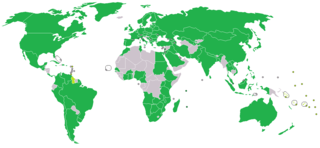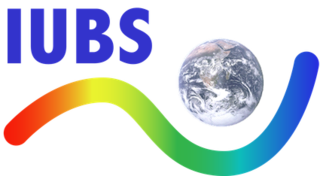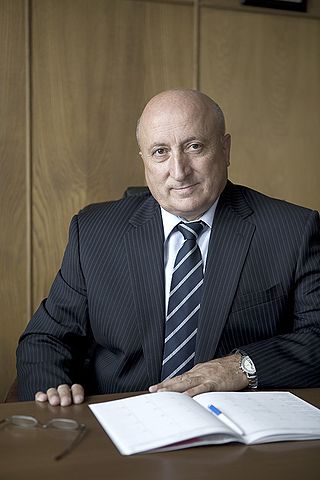
The International Mathematical Union (IMU) is an international organization devoted to international cooperation in the field of mathematics across the world. It is a member of the International Science Council (ISC) and supports the International Congress of Mathematicians (ICM). Its members are national mathematics organizations from more than 80 countries.

The International Council for Science was an international non-governmental organization devoted to international cooperation in the advancement of science. Its members were national scientific bodies and international scientific unions.
Psychology is the scientific study of mind and behavior. Its subject matter includes the behavior of humans and nonhumans, both conscious and unconscious phenomena, and mental processes such as thoughts, feelings, and motives. Psychology is an academic discipline of immense scope, crossing the boundaries between the natural and social sciences. Biological psychologists seek an understanding of the emergent properties of brains, linking the discipline to neuroscience. As social scientists, psychologists aim to understand the behavior of individuals and groups.

The American Psychological Association (APA) is the main professional organization of psychologists in the United States, and the largest psychological association in the world. It has over 157,000 members, including scientists, educators, clinicians, consultants, and students. It has 54 divisions, which function as interest groups for different subspecialties of psychology or topical areas. The APA has an annual budget of around $125 million.
Applied psychology is the use of psychological methods and findings of scientific psychology to solve practical problems of human and animal behavior and experience. Educational and organizational psychology, business management, law, health, product design, ergonomics, behavioural psychology, psychology of motivation, psychoanalysis, neuropsychology, psychiatry and mental health are just a few of the areas that have been influenced by the application of psychological principles and scientific findings. Some of the areas of applied psychology include counseling psychology, industrial and organizational psychology, engineering psychology, occupational health psychology, legal psychology, school psychology, sports psychology, community psychology, neuropsychology, medical psychology and clinical psychology, evolutionary psychology, human factors, forensic psychology and traffic psychology. In addition, a number of specialized areas in the general area of psychology have applied branches. However, the lines between sub-branch specializations and major applied psychology categories are often mixed or in some cases blurred. For example, a human factors psychologist might use a cognitive psychology theory. This could be described as human factor psychology or as applied cognitive psychology. When applied psychology is used in the treatment of behavioral disorders there are many experimental approaches to try and treat an individual. This type of psychology can be found in many of the subbranches in other fields of psychology.

The International Union of Biological Sciences (IUBS) is a non-profit organization and non-governmental organization, founded in 1919, that promotes biological sciences internationally. As a scientific umbrella organization, it was a founding member of the International Council for Science (ICSU).
The International Union of Basic and Clinical Pharmacology (IUPHAR) is a voluntary, non-profit association representing the interests of scientists in pharmacology-related fields to facilitate Better Medicines through Global Education and Research around the world.
The International Commission on Mathematical Instruction (ICMI) is a commission of the International Mathematical Union and is an internationally acting organization focussing on mathematics education. ICMI was founded in 1908 at the International Congress of Mathematicians (ICM) in Rome and aims to improve teaching standards around the world, through programs, workshops and initiatives and publications. It aims to work a great deal with developing countries, to increase teaching standards and education which can improve life quality and aid the country.
International or global psychology is an emerging branch of psychology that focuses on the worldwide enterprise of psychology in terms of communication and networking, cross-cultural comparison, scholarship, practice, and pedagogy. Often, the terms international psychology, global psychology, transnational psychology, and cross-cultural psychology are used interchangeably, but their purposes are subtly and importantly different: Global means worldwide, international means across and between nations, transnational means to transcend the nation-state, cross-cultural means across cultures. In contrast, the term "multicultural" is more often used to refer to ethnic and other cultural differences existing within a given nation rather than to global or international comparisons.
The Society for Occupational Health Psychology (SOHP) is the first organization in the United States to be devoted to occupational health psychology. It is dedicated to the application of scientific knowledge for the purpose of improving worker health and well-being.
The Journal of Transpersonal Psychology (JTP) is a semi-annual, peer-reviewed academic journal which is published by the Association for Transpersonal Psychology (ATP). The journal is a seminal publication in the field of transpersonal psychology. According to sources the journal is addressing the interface between psychology and spirituality, and the area of spirituality as a legitimate topic for academic studies.
Luciano L'Abate was an Italian psychologist who worked in the United States. He was the father of relational theory and author, co-author, editor or co-editor of more than 55 books in the field of American psychology.
Merry Bullock, is an American psychologist. She studied at Brown University for her BA and University of Pennsylvania for her PhD, both in psychology.
The International Test Commission (ITC) is an association of national psychological associations, test commissions, organizations and individuals, who promote "the proper development, evaluation and uses" of educational and psychological tests. The ITC is a non-profit organization, affiliated to the International Association of Applied Psychology (IAAP) and the International Union of Psychological Science (IUPsyS). The ITC stimulates international cooperation on research projects relevant to a scientifically and ethically sound use of tests. ITC develops guidelines on the use of tests; holds a biennial international conference; publishes a peer-reviewed journal and a newsletter.
Wayne Harold Holtzman was an American psychologist best known for the development of the Holtzman Inkblot Test. Holtzman received a master's degree from Northwestern University and a doctorate from Stanford University. He worked at the University of Texas at Austin from 1949 until he retired in 1993. He developed the Holtzman Inkblot Test to address deficiencies in the Rorschach test.
Sathasivan "Saths" Cooper is a clinical psychologist in South Africa who was born in Durban of Indian-South African background. He began to identify with the Black Consciousness Movement (BCM) and joined the South African Students' Organisation (SASO), and was one of the so-called "SASO Nine" student leaders arrested in 1974 for their anti-Apartheid activities. During this time Saths spent nine years banned, house arrested and jailed, including over five years in Robben Island where he shared a cell block with Nelson Mandela.

Sedrak A. Sedrakyan is an Armenian psychologist, doctor of Psychological Sciences, and professor.
The Interamerican Society of Psychology is an organization representing the interests of psychologists throughout the Americas. It is more commonly known by its Spanish title Sociedad Interamericana de Psicología (SIP). It is also known by its French title Société Interaméricaine de Psychologie. The organization's official languages are Spanish, English, Portuguese, and French.
Roger Wolcott Russell (1914–1998) was a biological psychologist who worked in both the UK and the USA.

The International Union for Pure and Applied Biophysics (IUPAB) is an international non-governmental organization whose mission is to assist in the worldwide development of biophysics, to foster international cooperation in biophysics, and to help in the application of biophysics toward solving problems of concern to all humanity. It was established in 1961 as the International Organisation for Pure and Applied Biophysics but then renamed as the International Union in 1966, when it became a member of ICSU, which itself was renamed in 2018 as ISC, the International Council for Science. Affiliated to it are the national adhering bodies of 61 countries, as well as the European Biophysical Societies' Association (EBSA), the Asian Biophysics Association and the Biophysical Society.






